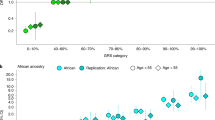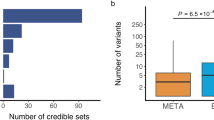Abstract
Prostate cancer appears to result from complex interactions among genetic, endocrine and environmental factors. Identification of risk factors for development and progression of prostate cancer is needed. This will allow researchers to design strategies to reduce the morbidity and mortality from this cancer and to identify individuals at increased risk of developing the disease. It is probable that common genetic polymorphisms (variants) in genes directly and indirectly involved in androgen biosynthesis, metabolism and regulation are important. Other important genes are likely to be those directly involved in regulation of prostate cell proliferation and apoptosis.
This is a preview of subscription content, access via your institution
Access options
Subscribe to this journal
Receive 4 print issues and online access
$259.00 per year
only $64.75 per issue
Buy this article
- Purchase on Springer Link
- Instant access to full article PDF
Prices may be subject to local taxes which are calculated during checkout
Similar content being viewed by others
Author information
Authors and Affiliations
Rights and permissions
About this article
Cite this article
Neuhausen, S. The role of candidate genetic polymorphisms in the etiology of prostate cancer. Prostate Cancer Prostatic Dis 3, 236–240 (2000). https://doi.org/10.1038/sj.pcan.4500471
Received:
Accepted:
Published:
Issue Date:
DOI: https://doi.org/10.1038/sj.pcan.4500471



